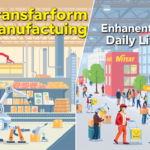Robotics is transforming the way we live and work, with applications ranging from manufacturing to healthcare, and even our daily lives. This article explores the impact of robotics on various industries and how it is shaping the future.
Robotics in Manufacturing
The manufacturing industry has been one of the earliest adopters of robotics. Robots are now an integral part of assembly lines, performing tasks with precision and efficiency. They can handle repetitive tasks, such as welding, painting, and packaging, with minimal errors and increased speed.
Robotic automation has led to significant cost savings for manufacturers. By reducing labor costs and minimizing waste, companies can produce goods more efficiently. Additionally, robots can work in hazardous environments, reducing the risk of workplace injuries.
Collaborative robots, or cobots, are a recent development in manufacturing. These robots work alongside human workers, enhancing productivity and safety. Cobots are designed to be user-friendly, allowing workers to easily program and control them.
Robotics in Healthcare
Robotics is also making waves in the healthcare industry. Surgical robots, such as the da Vinci Surgical System, enable surgeons to perform minimally invasive procedures with greater precision. These robots provide enhanced visualization and dexterity, leading to better patient outcomes.
Robotic exoskeletons are another innovation in healthcare. These devices assist patients with mobility impairments, helping them regain movement and independence. Additionally, robots are being used for rehabilitation, providing personalized therapy to patients recovering from injuries or surgeries.
Robotics in Daily Life
Robotics is not limited to industrial and medical applications; it is also becoming a part of our daily lives. Home robots, such as robotic vacuum cleaners and lawn mowers, are becoming increasingly popular. These devices automate household chores, saving time and effort.
Personal assistant robots, like Amazon’s Alexa and Google Home, are also gaining traction. These robots can perform a variety of tasks, from playing music to controlling smart home devices. They use AI to understand and respond to user commands, making life more convenient.
The Future of Robotics
The future of robotics is bright, with advancements in AI, machine learning, and sensor technology driving innovation. We can expect to see more sophisticated robots that can perform complex tasks and interact with humans in more natural ways.
In manufacturing, robots will continue to evolve, with increased autonomy and adaptability. In healthcare, robots will play a crucial role in diagnostics, treatment, and patient care. In our daily lives, robots will become more integrated, offering personalized assistance and enhancing our quality of life.
However, the rise of robotics also raises ethical and societal concerns. Issues such as job displacement, privacy, and security need to be addressed to ensure that the benefits of robotics are realized without negative consequences.
In conclusion, robotics is revolutionizing manufacturing, healthcare, and daily life. As technology continues to advance, robots will become an even more integral part of our world, shaping the future in ways we can only imagine.









